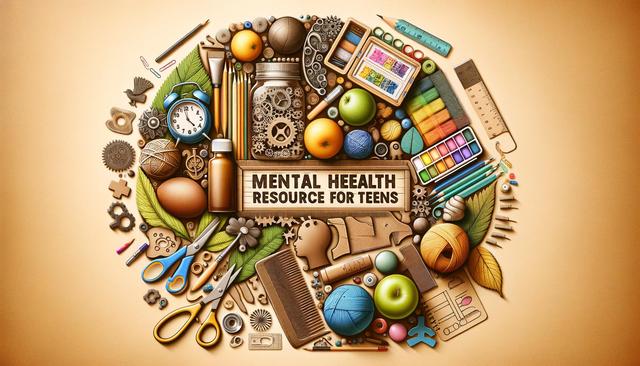Supporting Teen Well-Being: A Guide to Mental Health Resources
Navigate our Mental Health Resources for Teens Guide! Discover online therapy for adolescent anxiety support and practical tools for well-being. Find compassionate guidance, coping strategies, and connections to expert help. Empower yourself with valuable resources for emotional health.

Understanding Teen Mental Health Challenges
Adolescence is a crucial period marked by significant physical, emotional, and social changes. As teens navigate school, relationships, and identity development, they may also face mental health struggles such as anxiety, depression, and stress. Recognizing these challenges early can make a big difference in how teens cope and recover. Factors like peer pressure, academic expectations, family dynamics, and social media can contribute to emotional strain. It’s essential for teens and their caregivers to understand that mental health is just as important as physical health and should be approached with the same level of care and attention.
Some common signs that a teen may be facing mental health issues include:
- Persistent sadness or irritability
- Withdrawal from friends and activities
- Changes in eating or sleeping habits
- Difficulty concentrating in school
- Increased sensitivity to criticism or rejection
Early intervention is key. When these symptoms are noticed, it’s important to open up conversations and explore available mental health resources tailored specifically for teens.
Accessing Online Therapy and Counseling
One of the most accessible forms of support for teens today is online therapy. Virtual platforms have made it possible for adolescents to connect with licensed therapists from the comfort of their homes. This convenience can help reduce the stigma around seeking help and make it easier for teens to open up about their thoughts and feelings. Online therapy offers flexible scheduling, anonymity, and a range of communication methods such as video calls, messaging, or phone sessions.
When looking for online therapy services for teens, it’s important to consider:
- Whether the platform specializes in adolescent mental health
- Availability of licensed and experienced therapists
- Options for parental involvement or family counseling
- Data privacy and confidentiality policies
These services often cover a wide range of concerns including anxiety, depression, self-esteem issues, and family conflict. Many platforms also offer educational resources, worksheets, and mindfulness activities to support teens between sessions.
Building Coping Skills and Emotional Resilience
In addition to professional support, teens benefit greatly from learning coping strategies and building emotional resilience. These skills help them manage stress, regulate emotions, and navigate life’s challenges more effectively. Coping tools don’t eliminate stress or difficult emotions but provide constructive ways to handle them.
Some effective strategies include:
- Practicing mindfulness and meditation
- Journaling to express thoughts and feelings
- Engaging in physical activity or creative hobbies
- Establishing healthy sleep and nutrition habits
- Setting realistic goals and breaking tasks into manageable steps
Schools, community centers, and youth organizations often offer workshops or groups that teach these skills. Apps and online programs can also guide teens through exercises that promote self-awareness and emotional regulation.
Creating a Supportive Environment at Home and School
Supportive environments play a crucial role in a teen’s mental wellness. At home, open communication, empathy, and consistency help teens feel safe and understood. Caregivers should foster a space where mental health is discussed openly, and seeking help is encouraged. Regular check-ins, active listening, and validation of feelings can make a significant difference.
At school, mental health resources should be easily accessible and visible. School counselors, psychologists, and peer support programs offer valuable assistance. Educators and staff can also be trained to recognize warning signs and refer students to proper channels of support.
Key elements of a supportive environment include:
- Access to trusted adults who listen without judgment
- Clear boundaries and consistent routines
- Encouragement of self-expression through art or conversation
- Reinforcement of positive behaviors and achievements
When teens feel supported both at home and in school, they are more likely to seek help and engage in healthy behaviors.
Connecting with Peer and Community Resources
In addition to professional and family support, peer and community networks can provide teens with a sense of belonging and understanding. Many teens find it easier to talk to others who have gone through similar experiences. Peer support groups, both in-person and online, offer safe spaces for sharing and encouragement.
Community resources such as youth mental health organizations, helplines, and local workshops offer free or low-cost programs aimed at teen wellness. These programs often include group activities, skill-building sessions, and opportunities for mentorship.
Teens can explore:
- Local mental health awareness events and campaigns
- Youth clubs and volunteer opportunities
- Online forums moderated by professionals or trained peers
- Helplines that provide immediate support and guidance
By participating in community and peer-based initiatives, teens not only receive support but also build connections and confidence in managing their mental health journeys.
Conclusion: Empowering Teens with Knowledge and Support
Supporting teen mental health requires a multi-faceted approach that includes access to professional care, supportive environments, effective coping tools, and peer connections. By making use of available mental health resources, teens can learn to manage their emotions, overcome challenges, and build a strong foundation for lifelong well-being. Caregivers, educators, and communities all play a role in creating a nurturing space where teens feel seen, heard, and empowered to seek help when needed. With the right resources and support systems in place, adolescents can thrive emotionally and mentally during this critical stage of life.